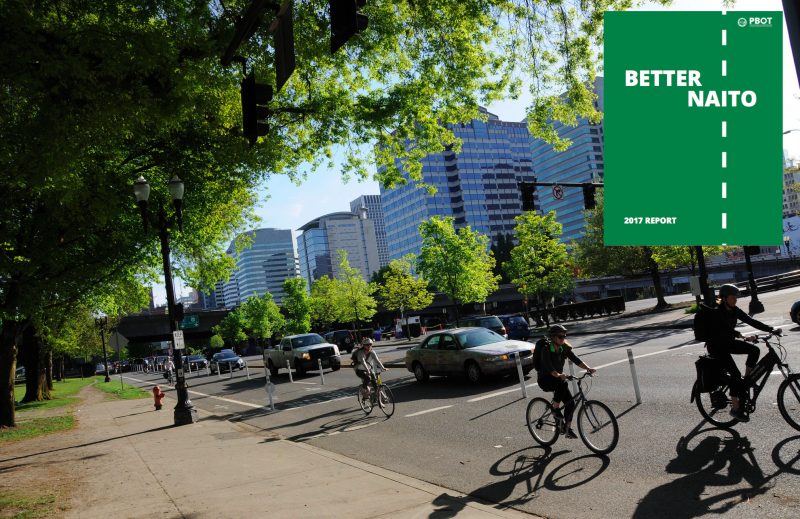
With just two months before they re-implement Better Naito, the City of Portland has released a 26 page report (PDF) touting its successful run last year.
The reconfiguration of Naito Parkway — which includes a protected spaces for biking and walking on the east side of the street — will return on May 1st and will run through September 30th. Better Naito begain in 2015 as a demonstration project of volunteer-led Better Block PDX. 2017 was the first year the project was fully under City of Portland purview.
The City is eager for Better Naito season because analysis from the Bureau of Transportation shows it’s working very well. “The project was incredibly popular with people walking and biking. In just one day, over 12,000 people walking used Better Naito to access the Waterfront Blues Fest,” PBOT wrote in a press statement. “What’s more, a total of 393,173 one-way trips were taken by people on bikes on Better Naito over the five-month project period.”
Many Naito users were happy with the additional safety for biking and walking. Thanks to the (locally-developed) Ride Report app, PBOT can claim that people bicycling were twice as likely to ride Better Naito than the Waterfront Trail. Bicycle users were also 3.5 times as likely to ride on Naito Parkway during the Better Naito season than during the off-season.
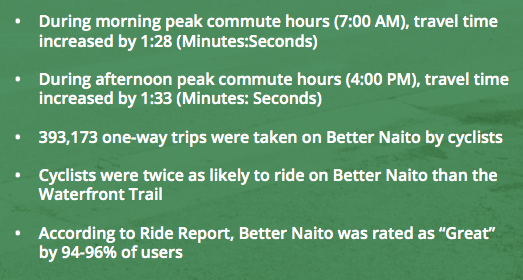
And for people who drove cars and trucks, the impact of the reconfiguration on their travel times was “minimal”. Citing their own analysis and observations, PBOT says driving times for northbound auto users during the morning commute (7:00 to 8:00 am) increased by just 1 minute and 28 seconds (between Clay and Stark). Travel times were similar for the evening commute (4:00 to 5:00 pm), where it took drivers an additional 1 minute and 33 seconds to move through the street.
Advertisement
To put the popularity of Better Naito into perspective, PBOT counts showed that bicycle users accounted for nearly one-third (31%) of the total northbound traffic volume in the PM peak.
Here are a few other charts from the report:
Learn more about Better Naito at the official website and check out the full report here.
— Jonathan Maus: (503) 706-8804, @jonathan_maus on Twitter and jonathan@bikeportland.org
Never miss a story. Sign-up for the daily BP Headlines email.
BikePortland needs your support.



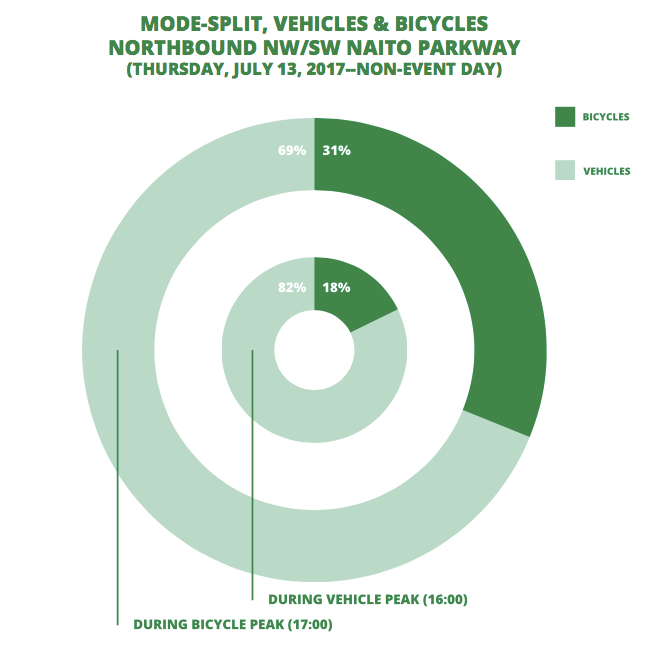
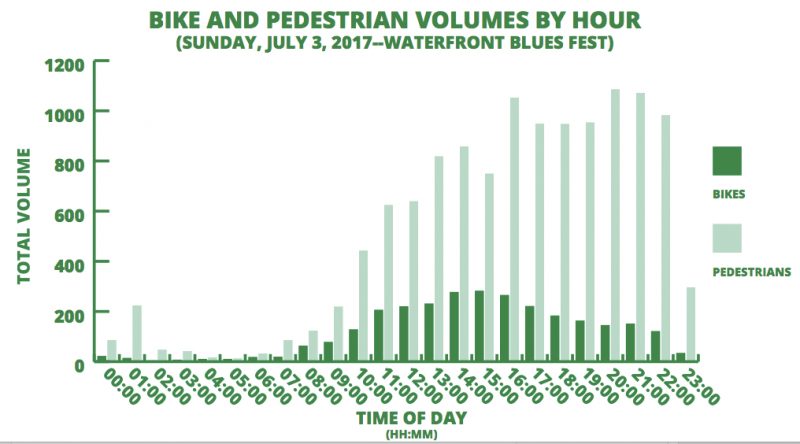
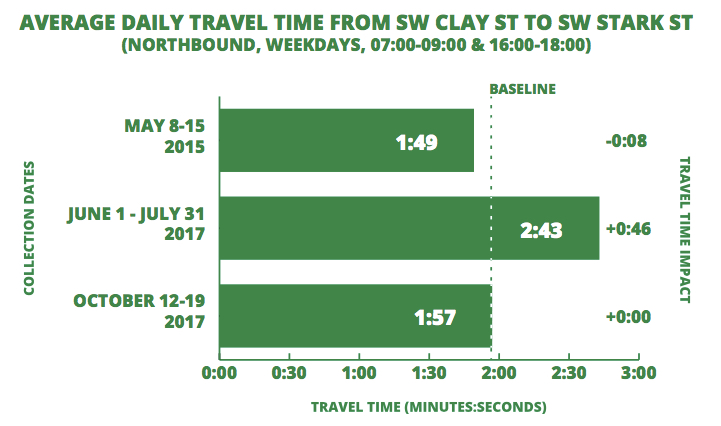

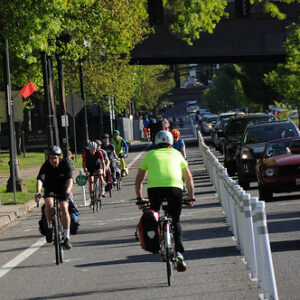
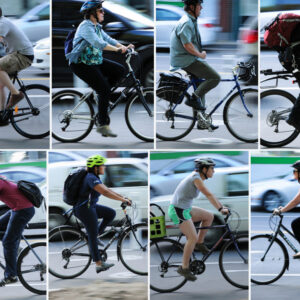
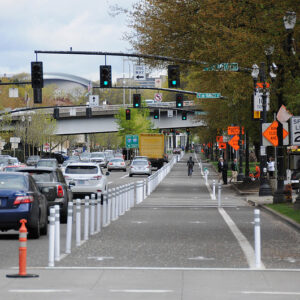
Thanks for reading.
BikePortland has served this community with independent community journalism since 2005. We rely on subscriptions from readers like you to survive. Your financial support is vital in keeping this valuable resource alive and well.
Please subscribe today to strengthen and expand our work.
but those seconds were excruciatingly traumatic because, sometimes, people driving had to watch people cycling pass them (on a bike!!!).
There were rumors circulating that this was the year Better Naito was going to become a permanent installation, due to the hard data on its successful use and implementation last year (featured here), as well as an expired agreement with Saturday Market to use the bike lane for loading and unloading. Looks like we’ve gotta keep waiting…
I sent an aggrieved email in reply to their self congratulatory press release. What are they afraid of?
mh
IMO if it comes out again at the end of this season it will be a colossal failure of activists and mayoral leadership. Hopefully we can all rally around a campaign to keep it permanent! (question is: Who starts the campaign? Bike Loud PDX? The Street Trust? Mayor Wheeler? An ambitious City Commissioner?)
I forwarded my email and the city’s response to BikeLoud this morning.
Whose decision is it to keep it in? Is there one person who has the authority to decide to make it permanent?
Also, who starts the campaign? BikePortland!
Give Jonathan something to write about, and he will do his part. Can’t do it all himself.
A 1.5 minute increase on a 2 minute trip is a big jump.
Common sense tells me that no one driving on Naito during the morning rush hour is taking that road to make a two minute trip.
No doubt, but that’s how the data is presented. Perhaps instead of “trip” I should have used the word “segment”.
I should be clear that I support a permanent Better Naito, though I would prefer a permanent Better Better Naito, with better separation of pedestrians, and, perhaps, a single-direction protected bike path on both sides of the street.
Huge, actually. How many fewer cars used Naito for rush hour during “Better Naito”? To focus only on travel time and ignore reduction in capacity is rather disingenuous.
Also, what was the resulting increase on surrounding roads for volume and travel time?
The data from the city seems to leave that out.
This is the line of thinking that leads to 8-lane urban freeways.
What about the 1.5-2 minute decrease in travel time for people on bikes? After all avoiding all those pedestrians along the waterfront path has a time cost
Fair point. But in my view this adds to the argument that Better Naito only makes sense during the festival period. Pedestrians are pretty scarce during the rest of the year.
Not really. Any reasonably nice day during the winter there will be a fair amount of runners, as well as casual strollers. Just yesterday was fairly crowded with both people walking, jogging, and cycling. There’s definitely value in a year-round Better Naito.
Of course pedestrians are scarce the rest of the year. There’s no sidewalk along the east side of Naito, and the demand path along there is a mudpit.
Hah. I bike through today twice, at 12.45 and again at 5pm, and it was as packed as it usually is in the summer months. People flock to it anytime the sun comes out.
This project should have been permanent after the first or second trial. There was overwhelming public support last year and the year before that and the data collected showed that it imposes no significant delay on motor vehicles (not that it’s important IMO). One of the downsides of tactical urbanism is that it can easily become a temporary spectacle, a seasonal victory that involved parties can claim year after year.
The short-term and low-cost nature of tactical urbanism helps bring easy political wins for progressive public agencies (PBOT in this instance) to show that they are the champions of active transportation without real capital investment and political leadership. But to really move the needle, to really prioritize active transportation, temporary and seasonal projects will never be sufficient.
Sadly, overwhelming public support for many things in Portland does not translate into the election of candidates willing to actually implement these things.
Vote for and elect JoAnn Hardesty and Julia DeGraw on May 15 and I promise all of you a permanently better Naito.
It would surprise me that the increased time included the twice daily train breaks coming off the Steel bridge. These typically are a minimum of 1/2 hour. In the car I only notice them when the bikeway is in place. The trains just do not stop unless the bikeway is in place.
Are you saying that the train only breaks when Better Naito is in place? I’m having trouble understanding what your comment is trying to say.
In any case, the bus I was in last week got stuck at the Steel Bridge for a good 40 minutes due to a train. No Better Naito then.
If you like Better Naito and want to see it made permanent, please email City Council!
Getting political support behind it is the only thing missing from making it permanent!
mayorwheeler@portlandoregon.gov
dan@portlandoregon.gov
nick@portlandoregon.gov
amanda@portlandoregon.gov
Chloe@portlandoregon.gov
The statistics are misleading.
There are a lot more cyclists and fewer drivers in general in combination with how the waterfront park is used (i.e. festivals, relaxing, etc) during that season which make the impact look much bigger than it is. The reality is that there was little bike traffic on BN the final week and it wasn’t because the quality of BN had deteriorated.
The delay reported is even more misleading. First off, Clay to Stark is the fastest part of the whole road and a third of the segment they were measuring is before BN even starts. In addition, traffic is not spread anywhere close to evenly throughout the hour so the average delay among all drivers for that short and relatively fast section is not representative for what many drivers experience. When things are moving (which is a lot of the time), a lot of drivers get through and which dramatically lowers the average time.
If you tell people they’re only sitting in the traffic for a minute in a half, they won’t take you seriously. And why should they? The reason everyone here chuckles about the traffic is they know it’s awful.
First, I’m not sure where your data that the final week of BN had little bike traffic came from. I don’t see that in the report. Is it anecdotal? I know I rode on BN in it’s final week, just like I did all prior weeks.
Second, the reason they reported delay from Clay (before BN starts) to Stark was to catch the potential for backed-up traffic as two lanes merge into one. I think that’s a good way to try to catch the impact. Naturally, after the merge is complete, traffic flows smoothly in the single lane. I had to drive to work on Naito a number of time last summer (instead of my normal bike commute) and my anecdotal experience is that the delay going north-bound in the morning was very minor.
I agree. Choosing to operate a 4000lb vehicle in a dense urban environment and expecting unimpeded is rather silly.
And Better Naito will only be in place for five months because why? Car traffic is higher in the winter??
# of miles of permanent PBLs installed while Wheeler has been in office: <1
We have a protected bike lane? Where?! Don’t say second ave.
NE Multnomah (westbound between 15th and 7th) is protected at times by planters, parked cars, and plastic wands. NE Cully has plastic wands north of Fremont.
It’s not miles and miles of protected bike lanes or anything, but I believe both spots would technically qualify.
Where was the fraction of a mile built (or painted, even)?
Why does this particular section of Naito gets so much attention compared to other areas? This specific mile already has a bike lane with virtually no hook threats and is among the easiest sections of busy road in Portland.
The section before “Better” Naito also passes by a popular park and with orders of magnitude more threats than “normal” Naito. Why is practically nothing said about that? And while Naito north of BN has a bike lane, it’s still not nearly as friendly from a riding perspective as “normal” Naito.
I’m enjoying the end of the winter riding. I personally think it’s a shame to wall off all that space along the waterfront and mess up a beautiful area — which is the whole reason BN is necessary. Nothing says progress like amplified noise, clouds of dust, and throngs of people.
There is not an adjacent sidewalk on the eastside of Naito.
I don’t think it negates the need for BN- particularly during summer/festival season – but I agree that improving, e.g. adding any bike lane at all on Naito south of BN would do multitudes more to improve my daily commute on Naito. As is, it’s the only place in the entire City I regularly ride on a sidewalk.
Based on your first couple of sentences, it’s clear that you’ve never ridden southbound on Naito without the two-way bikeway installed.
pretty sure the section south of Better Naito is also being addressed: https://bikeportland.org/2018/01/11/heres-what-you-missed-at-the-sw-naito-project-open-house-264272
I did see it and am will be totally psyched if/when it is built.
I would also add that festival season is not “the whole reason BN is necessary.” I agree that the festivals are a stupid use of public space, but I doubt they’re going anywhere soon. anyway, Naito isn’t a whole lot of fun to ride on outside of the festival season, either. the northbound lane is narrow and made narrower by catch basins. motorists regularly honk and scream at me while driving dangerously. and it’s not easy to ride side-by-side with another cyclist. I’m not a huge fan of Better Naito, and there are plenty of improvements that could be made to Naito with or without the Better Naito brand. suggesting that shutting down festivals would negate Better Naito’s benefit strikes me as more than a bit silly.
What if they periodically closed Naito and put the festivals on the street? Then spillover could be on the waterfront park, and the waterfront could remain free and open to everyone! Bikes and peds could still use the seawall, access would be on existing streets, the City could still make money by charging to use space. Why not?
Sunny today on the the waterfront path. Overcrowded. A few people with mental illness who I worried about. One guy sitting unsteady on a cleat waving his arms, yelling. People on bikes and jogging and walking steering clear. One standing on the river side of the railing (!) smiling, shaking badly and talking to a police officer. Whose SUV made a bottleneck. A guy (on the safe side of the railing) in a bright green dinosaur costume. More T-rex than vegetarian. Hundreds of commuters on bikes, going 8 mph. Normal cruising speed would be twice that. Add 4 minutes to your trip time? Oh no! Naito bike lanes getting… barely any takers. Because they’re wretched and smelly and narrow and dangerous with people driving dump trucks, garbage trucks, semi trucks, Highlanders and “Armadas” fast, within inches. “Fast bikes use Naito Bike Lanes”! http://www.oregonlive.com/portland/index.ssf/2015/03/man_dies_after_truck_strikes_h.html
Better Naito even with its unheeded 20mph signs and run over candlesticks can’t come back soon enough.
Once again “Better Naito” misses most of why the existing bike infrastructure is inadequate: crossing the damned street. A few hundred feet of N/S buffer means little to me when I still have to choose between several bad, uncomfortable intersections to get between Waterfront Park and downtown, where I work. None of these intersections have much, if any, facilities for bikes. I cross 82nd every day on my bike as well, and honestly think it’s more predictable than the signals on Naito. Unless Better Naito is “phase one” in getting rid of automobiles on the street all together I still really don’t see the point of it all. It’s a solution looking for a problem.